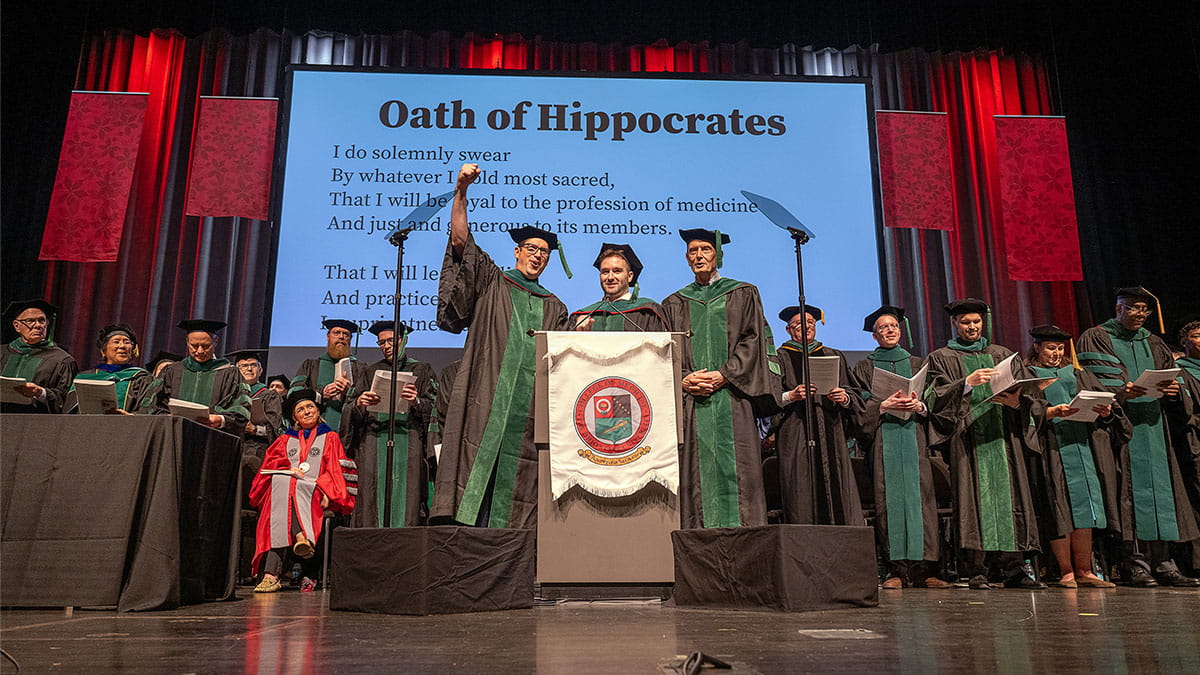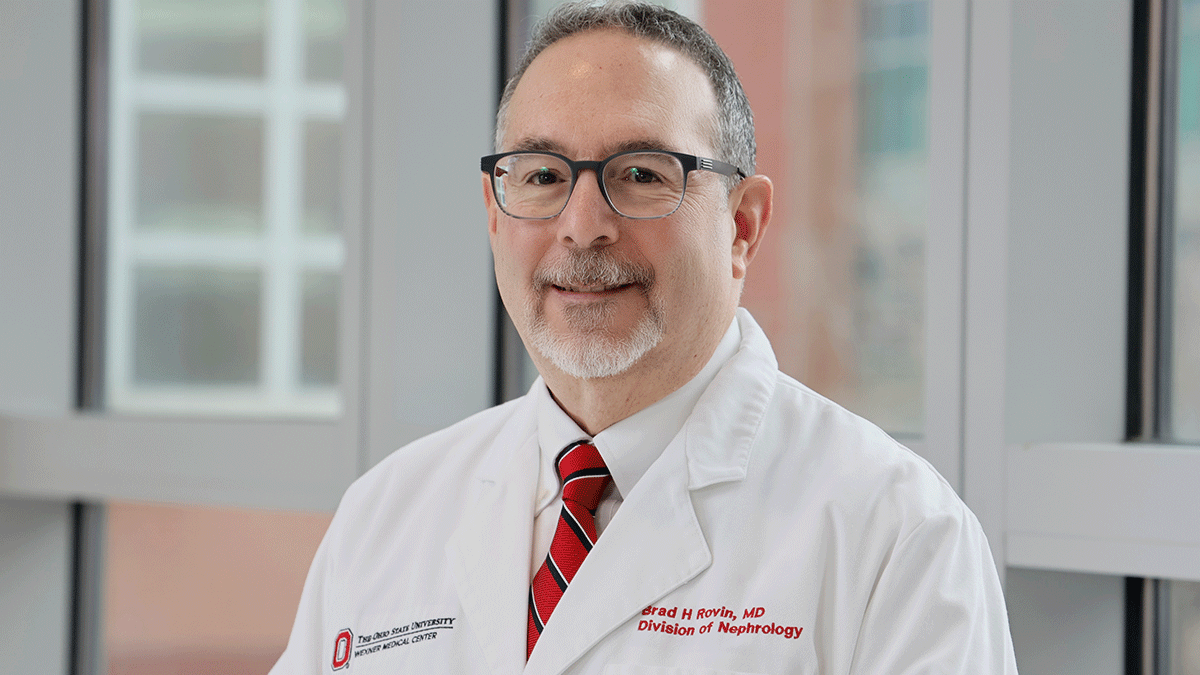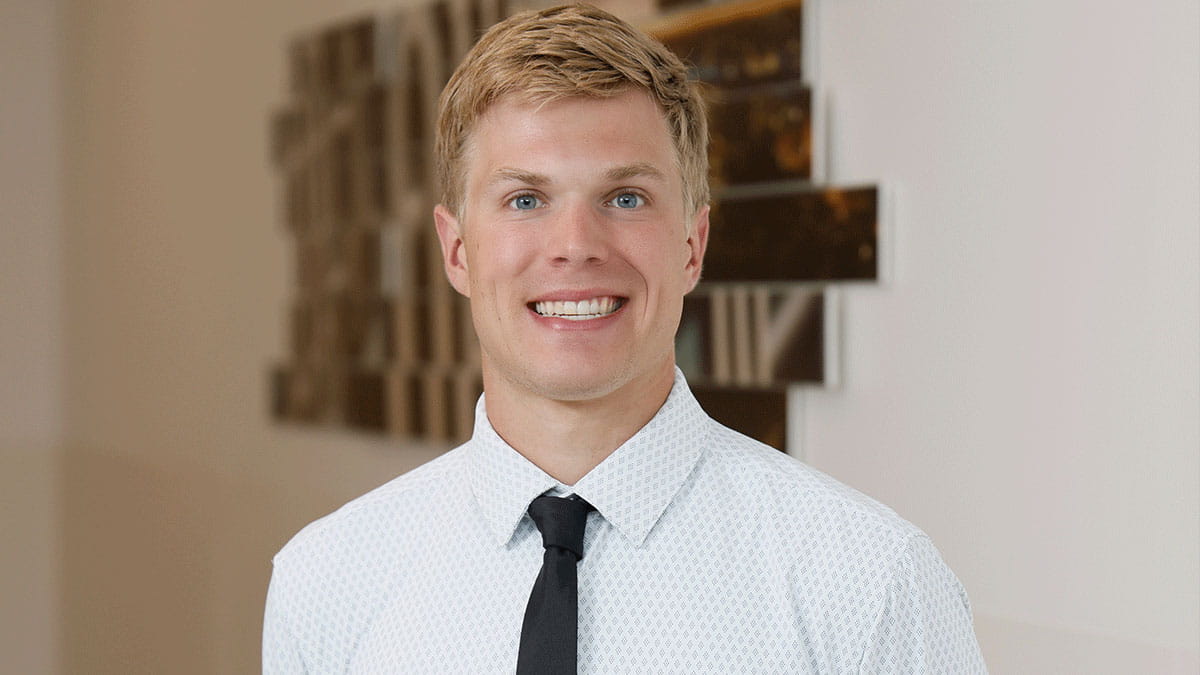Doctor's office-on-wheels offers community health care to people who can't easily get it

In the parking lot of a food pantry, an RV hums. People knock on the door, asking for help. They need a vaccine. They need their blood pressure or blood sugar checked, a prescription renewed. They have an infection that's not healing.
"We’re on fire,” Esha Simmons says as she gets up again to answer the door during a flurry of knocks.
Simmons is the community outreach coordinator for this doctor’s-office-on-wheels, the Community Care Coach, a 38-foot-long RV run by The Ohio State University Wexner Medical Center. Four days a week, the coach arrives at a different Columbus neighborhood where people need medical help and can’t easily get it. This stop on the south side of Columbus is the busiest.
“Did you have an appointment?” Simmons asks as she opens the door.
She knows the man. She hasn’t seen him in a while and welcomes him in. He’s forgotten the date of his upcoming appointment, so she checks the schedule, lets him know and hands him a printout of it. He says he’ll put it on his refrigerator so he doesn’t forget.
Removing obstacles to being healthy
Every year brings more patients to the coach, a service the Ohio State Wexner Medical Center began in Columbus in 2020, which serves about 350 patients a year at its weekly stops and at community events.
The coach has made it easier for people who might not have time, insurance or a way to get to an appointment. They can meet regularly with a primary care doctor or an obstetrician/gynecologist to have healthier pregnancies and births, prevent health problems or keep them from getting worse.
The mobile service continues through Oct. 1. Primary care providers with Ohio State Wexner Medical Center are working with community partners to help decide what future services will be offered for people facing obstacles to better health.
The state and the Wexner Medical Center fund the service offered to people regardless of their ability to pay. No patient pays a copay. If they have no insurance, no problem. On board the community care coach, a doctor, a medical assistant and Simmons are not only helping prevent and treat health issues, they’re building trust.
“Some patients haven’t seen a doctor in decades,” says Navraj Pannu, MD, a family medicine physician who staffs the coach when it stops on the south side of Columbus. She also serves as assistant clinical professor of Family and Community Medicine at The Ohio State University College of Medicine.
“A lot of our patients come to us from the emergency department. They had a heart attack or an amputation. They need to get their blood pressure or blood sugar under control."
Health care delivered to the heart of the community
On a recent morning, Dr. Pannu started the day checking the blood pressure of a man in his fifties who wasn’t taking his medication regularly. He didn’t know he had to, to keep his blood pressure from rising. Dr. Pannu explained how taking the medication every day would not only bring down his blood pressure but also lower his risk of heart disease and stroke.
“Knowing how to get appointments and refills on medications and why it’s important to keep taking medications for chronic conditions, that all might seem simple,” Dr. Pannu says. “But it would not be intuitive to you if you haven’t seen a primary care doctor in years or never grew up seeing a doctor regularly.”
A few years ago, Dr. Pannu lived just blocks away from the south side stop where he now cares for patients on the coach twice a month. He recommended the spot because of all the foot traffic around it: a bus stop, a food pantry and a nonprofit that offers free clothes and other items.
“It’s important to practice what we preach and be available in communities that need it the most,” Dr. Pannu says. “I have a patient who hadn’t been to a primary care doctor in 40 years.”
For the past two years, the man has seen Dr. Pannu. And he sent both his brother and his son to him as well. That’s exactly what the mobile unit is designed to do, linking more and more people with care to keep a health issue from turning into a major health condition.
Mobile clinic much like a standard doctor’s office
Around Columbus, the coach offers primary care three days a week and one day a week with an obstetrician/gynecologist.
Except for the hum of the heater during the winter and the occasional vibrations on the floor, it’s easy to forget you’re in an RV. There’s a patient exam room at each end, a bathroom and a reception area in the middle where patients check in and schedule appointments.
Nearly everything that can be done in a doctor’s office can be done on the coach. Blood and urine can be collected, Pap tests and ultrasounds performed, along with checks on blood pressure, cholesterol and blood glucose.
A ‘walking time bomb'
Lloyd Clark knocked on the coach’s door recently for a couple of vaccinations before he picked up his granddaughter from school.
For many years, Clark skipped regular checkups and didn’t notice his health getting worse. Then last fall, he had a free biometric screening after a wellness walk. The results shocked him: His blood pressure was higher than he expected.
“I was a walking time bomb,” he says.
Clark joined Black Impact 2.0, a program run by the Ohio State Wexner Medical Center to improve the health of Black men improve the health of black men through diet, exercise and regular checks on blood pressure, cholesterol and other measures of health. The program encouraged him to get a primary care doctor, so he began seeing Dr. Pannu, who started him on medication to lower his blood pressure.
Already, Clark, who’s 68, is seeing a major drop in his blood pressure. Now he’s looking into what else he should do to prevent chronic illnesses.
“It’s like an old car,” he says of his body. “You have to keep up on the maintenance.”
Health care equity: A worthy mission
As one of the doctors on the coach, Kamilah Dixon, MD, an obstetrician-gynecologist with the Wexner Medical Center, meets with patients for prenatal care, ultrasounds and Pap smears and for advice on birth control, diet or any other issues they might face.
“When I see patients on the mobile unit who otherwise would not be able to get care, that makes me feel like what I’m doing is worthy. It reaffirms why I’m in medicine,” says Dr. Dixon, who’s also a associate clinical professor of Obstetrics and Gynecology with the Ohio State College of Medicine.
Some of the women Dr. Dixon treats never had a doctor for their previous pregnancies. Some haven’t had a Pap smear in several years. Getting prenatal care, they have a greater chance of having healthy pregnancies and births, which is particularly important in Franklin County, where the rate of infants dying within their first year is more than the national and state average but has been improving.
“People are getting care who previously had limited care and didn’t or couldn’t continue with it,” Dr. Dixon says. “They don’t have to worry about the copay, transportation or office hours they can’t make.”
Forging relationships
Sometimes what keeps people from seeking care is that they’re skeptical of doctors, of the medical system overall. On the coach, doctors don’t wear their white lab coats, creating a less formal atmosphere and getting rid of another degree of separation between doctors and their patients.
The goal is to create trust by offering consistently good care, pulling up every two weeks at the same spot, at the same time, regardless of the weather, and answering every knock on the door.



